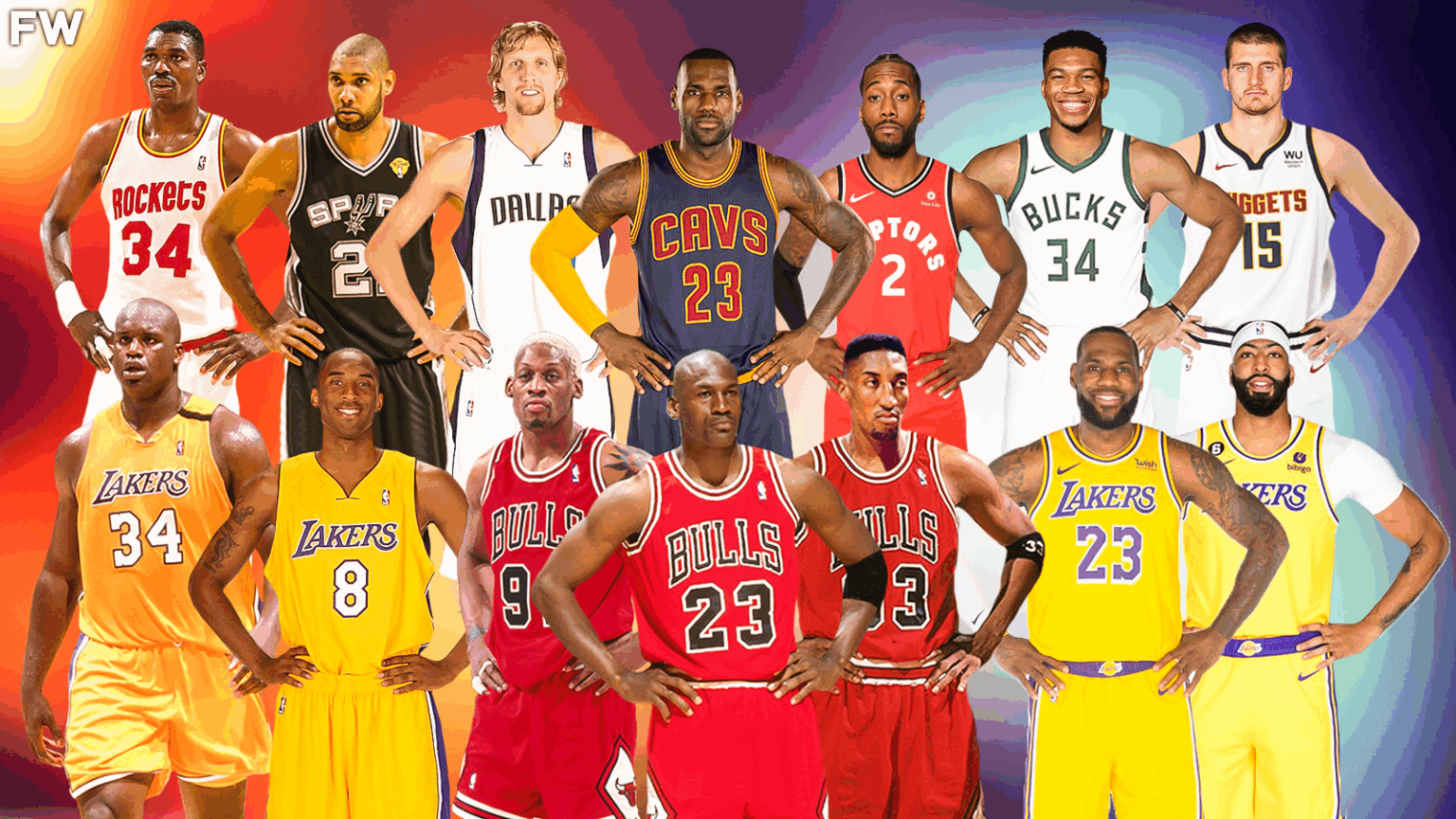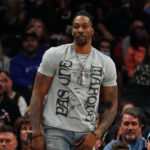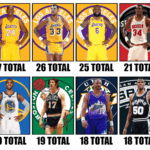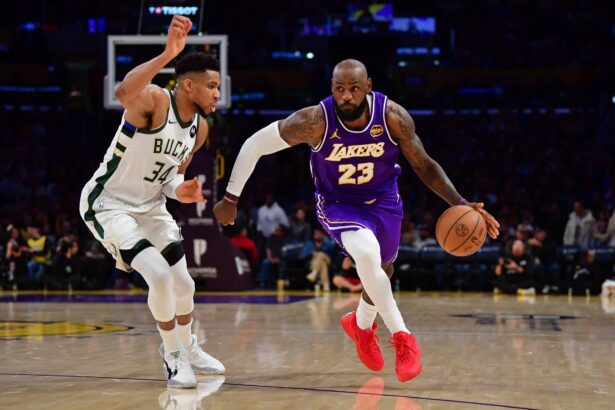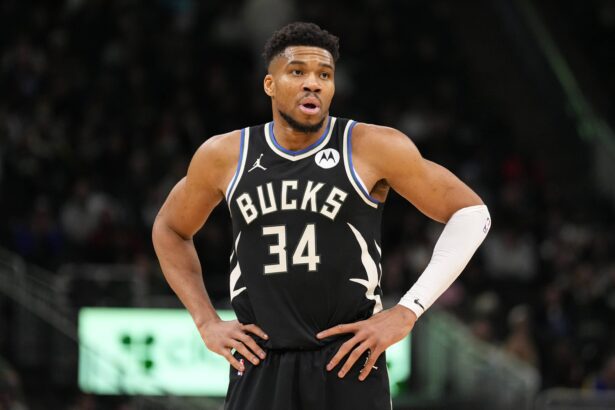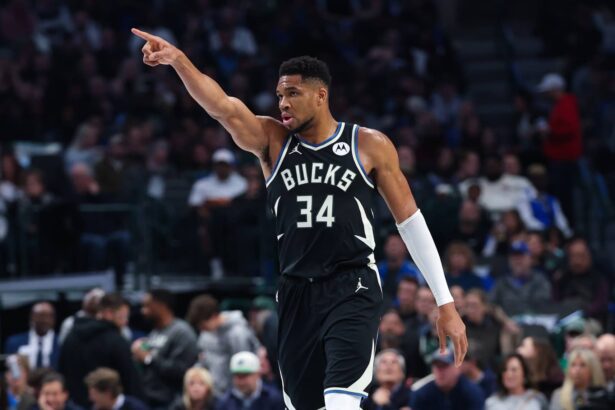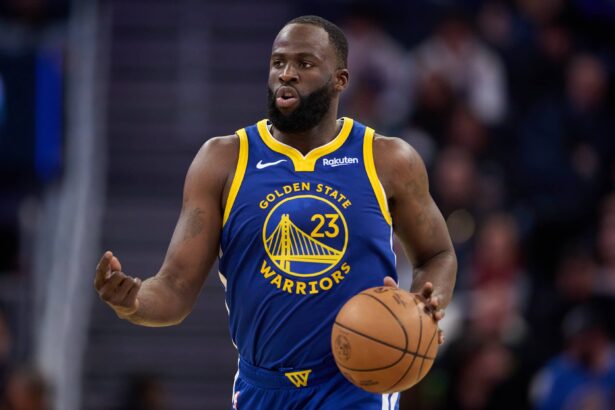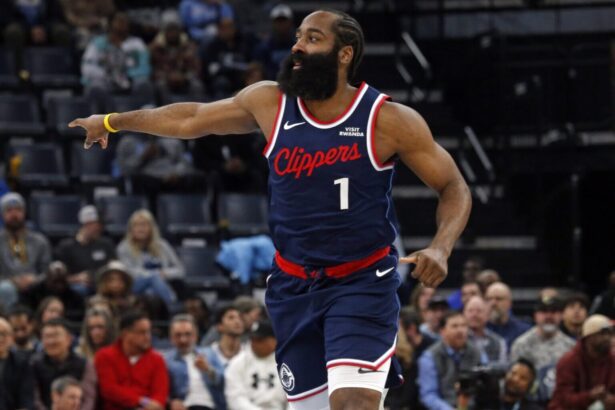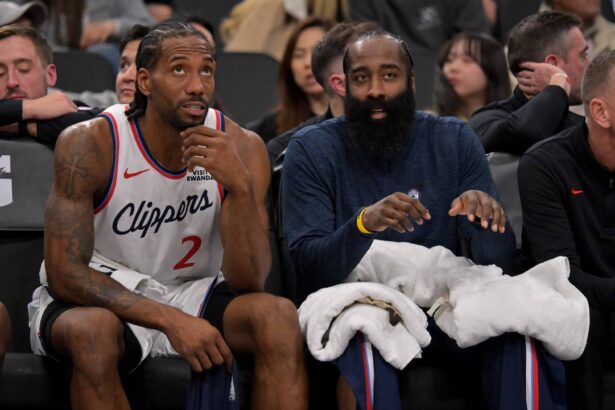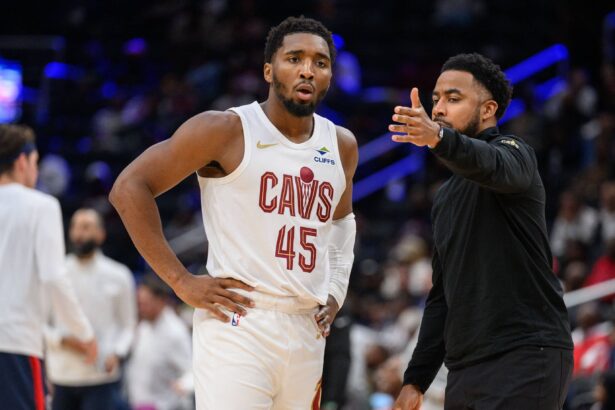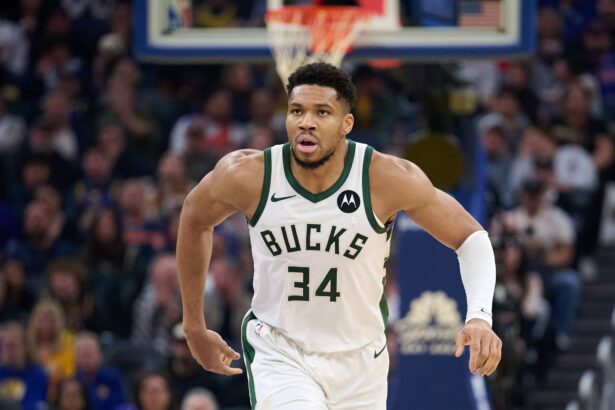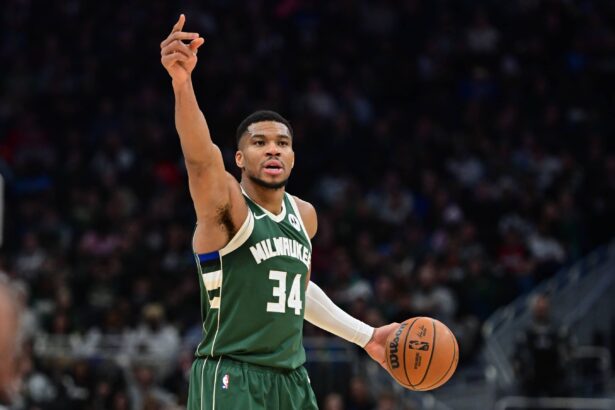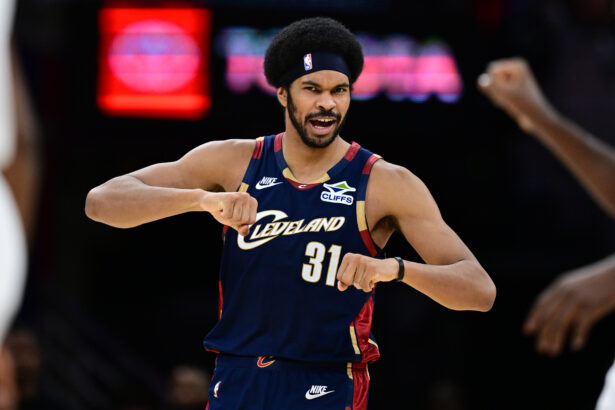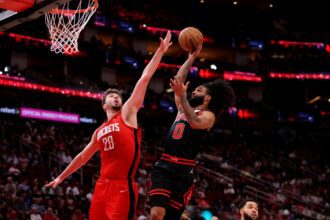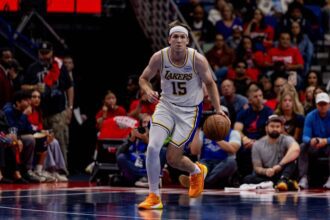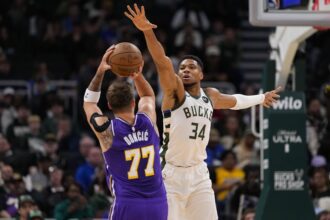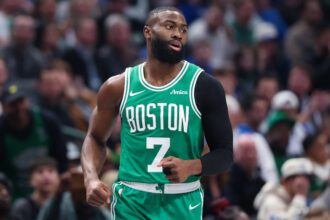- Superteams have taken over the NBA over the past decade
- Not every NBA champion was a superteam throughout history
- Since 1990, the NBA champions have been mainly non-superteams
In the fast-paced and high-flying world of professional basketball, NBA superteams have long been the talk of the town, captivating fans, and dominating headlines. With star-studded rosters and unprecedented levels of talent, these powerhouse teams have often been viewed as the favorites in the race for the elusive Larry O’Brien Championship Trophy.
- 1990-91 Chicago Bulls
- 1991-92 Chicago Bulls
- 1992-93 Chicago Bulls
- 1993-94 Houston Rockets
- 1994-95 Houston Rockets
- 1995-96 Chicago Bulls
- 1996-97 Chicago Bulls
- 1997-98 Chicago Bulls
- 1998-99 San Antonio Spurs
- 1999-00 Los Angeles Lakers
- 2000-01 Los Angeles Lakers
- 2001-02 Los Angeles Lakers
- 2002-03 San Antonio Spurs
- 2003-04 Detroit Pistons
- 2004-05 San Antonio Spurs
- 2005-06 Miami Heat
- 2006-07 San Antonio Spurs
- 2008-09 Los Angeles Lakers
- 2009-10 Los Angeles Lakers
- 2010-11 Dallas Mavericks
- 2013-14 San Antonio Spurs
- 2014-15 Golden State Warriors
- 2015-16 Cleveland Cavaliers
- 2018-19 Toronto Raptors
- 2019-20 Los Angeles Lakers
- 2020-21 Milwaukee Bucks
- 2022-23 Denver Nuggets
Yet, beyond the glitz and glamor of superteams lies a collection of captivating and inspiring stories, where teams with grit, resilience, and sheer determination have risen against all odds to claim NBA glory.
This article delves into the enthralling history of non-superteam NBA championship rings since 1990, shedding light on squads that have defied expectations and etched their names in basketball lore.
From improbable upsets to teams that just relied on a main superstar player, it is time to name the championship teams since 1990 that were not superteams. To define a superteam, it is a roster that has at least three All-Star players at one time.
So the 2011-12 Miami Heat that won a championship would be considered a superteam as LeBron James, Dwyane Wade, and Chris Bosh were all All-Star players.
Without further ado, here are the non-superteams that won NBA titles since the 1989-90 season.
1990-91 Chicago Bulls
All-Stars: Michael Jordan
The 1990-91 Chicago Bulls were a remarkable team that clinched the NBA championship with only one official All-Star, the incomparable Michael Jordan. Under the guidance of head coach Phil Jackson, the Bulls underwent a transformation, evolving from a talented but inconsistent team into a cohesive and dominant force. Jordan’s unparalleled scoring ability and his uncanny knack for making clutch plays were the driving forces behind the Bulls’ success. He led the league in scoring, averaging an astonishing 31.5 points per game, and solidified his status as one of the greatest players in basketball history.
While other players on the team didn’t receive All-Star recognition that season, Scottie Pippen was rapidly emerging as a star and provided critical support to Jordan with his all-around skills and defensive prowess. Additionally, the Bulls’ supporting cast, including Horace Grant, John Paxson, and Bill Cartwright, played crucial roles and stepped up when needed, contributing significantly to the team’s overall success. The Bulls’ tenacious defense was one of their strengths, with Jordan and Pippen leading the charge on the perimeter.
With their relentless determination and a collective will to win, the 1990-91 Chicago Bulls proved that a team could secure an NBA championship even with just one official All-Star leading the way. Dealing with Magic Johnson and the Lakers, the Bulls got the job done, as it was Michael’s NBA to conquer going forward.
1991-92 Chicago Bulls
All-Stars: Michael Jordan, Scottie Pippen
A year later, the 1991-92 Chicago Bulls were an exceptional team that clinched the NBA championship with just two All-Star players – the legendary Michael Jordan and the versatile Scottie Pippen for the second straight season. Under the brilliant coaching of Phil Jackson, the Bulls displayed a level of cohesion and teamwork that elevated them to new heights.
Jordan, at the peak of his powers, led the league in scoring and showcased his unmatched offensive prowess and competitive spirit. Pippen was undoubtedly playing at an All-Star level, contributing with his exceptional all-around skills, defensive tenacity, and playmaking abilities. Their dynamic partnership on the court formed the foundation of the Bulls’ success, as they complemented each other perfectly and elevated the performance of the entire team. The supporting cast, including players like Horace Grant, B.J. Armstrong, Bill Cartwright, and John Paxson, played crucial roles and provided valuable contributions throughout the season and playoffs.
The Bulls’ defensive prowess was also a key factor, with Jordan and Pippen leading the charge on the perimeter, disrupting opponents and turning defense into offense. This championship victory further solidified Jordan’s legacy as the greatest player of his era and established Pippen as one of the league’s premier talents. The Bulls’ triumph against the Portland Trail Blazers marked their second consecutive NBA title and set the stage for a dynasty that would go on to dominate the NBA in the years to come.
1992-93 Chicago Bulls
All-Stars: Michael Jordan, Scottie Pippen
The 1992-93 Chicago Bulls continued their championship success with a roster featuring only two All-Star players, Michael Jordan and Scottie Pippen. Jordan, still the league’s preeminent scorer (32.6 PPG), provided consistent offensive dominance, while Pippen emerged as a star in his own right, showcasing all-around skills and defensive prowess that elevated his game to All-Star caliber levels. Their dynamic partnership and unyielding determination formed the nucleus of the team’s success, as they complemented each other’s strengths and led by example on and off the court.
With a collective focus on their goal and a winning mentality ingrained in their DNA, the 1992-93 Chicago Bulls showcased the power of teamwork, proving that a roster with just two official All-Stars (although having the GOAT helps) could secure an NBA championship. This victory marked the team’s third consecutive championship and further solidified Jordan’s and Pippen’s legacies as two of the greatest players in NBA history. It was also the first time superstar, and MVP of the league Charles Barkley of the Phoenix Suns, felt that he was simply incapable of leading his team to a victory during the 1993 season.
1993-94 Houston Rockets
All-Stars: Hakeem Olajuwon
The 1993-94 Houston Rockets achieved a remarkable feat by winning the NBA championship with just one official All-Star, the phenomenal Hakeem Olajuwon. Led by head coach Rudy Tomjanovich, the Rockets demonstrated resilience, adaptability, and unwavering determination throughout the season and playoffs. Olajuwon, known for his dominant post-play, was the anchor of the team, leading both offensively and defensively. He averaged an impressive 27.3 points, 11.9 rebounds, and 3.7 blocks per game during the regular season, earning his well-deserved All-Star selection.
However, what made this championship run truly unique was the Rockets’ ability to find success despite a relatively unheralded supporting cast. Players like Kenny Smith, Vernon Maxwell, and Robert Horry stepped up in crucial moments, making vital contributions to the team’s success. The team’s emphasis on tenacious defense and strong rebounding also played a pivotal role, with Olajuwon’s shot-blocking prowess and leadership setting the tone for the entire squad.
The Rockets’ championship victory against the New York Knicks showcased the power of a true team effort, with players selflessly working together to overcome more star-studded opponents. It exemplified that a cohesive unit, driven by the leadership of one exceptional player, could rise to greatness and lift the ultimate prize.
1994-95 Houston Rockets
All-Stars: Hakeem Olajuwon
With their second-straight championship, the Houston Rockets etched their names into NBA lore with a memorable championship run, led by their lone All-Star, the incomparable Hakeem Olajuwon. Under the guidance of head coach Rudy Tomjanovich, the Rockets faced numerous challenges during the regular season, including injuries to key players and inconsistent performances. Despite these obstacles, Olajuwon displayed his extraordinary skills as a dominant center, averaging 27.8 points, 10.8 rebounds, and 3.4 blocks per game, earning him his 10th All-Star selection.
However, what sets this championship victory apart is the inspiring and unlikely journey of the supporting cast. Players like Clyde Drexler, acquired in a mid-season trade, provided a significant boost to the team’s firepower and experience. Sam Cassell, Robert Horry, and Mario Elie emerged as unsung heroes, making game-changing plays and delivering crucial performances in the playoffs. The Rockets’ resilience and determination shone brightest during their playoff run, as they overcame higher-seeded opponents to claim the championship against a young Shaquille O’Neal and the Orlando Magic.
Even if Drexler was a former All-Star, he was slightly past his prime, and it was fully up to Hakeem to get the job done for the Rockets. In Michael Jordan’s absence from the league, he did it again, which is why he is, without a doubt, a top-5 center of all time.
1995-96 Chicago Bulls
All-Stars: Michael Jordan, Scottie Pippen
Guess whose back? After sitting out for almost two full seasons, Michael Jordan returned to dominate the NBA landscape. With All-Star Scottie Pippen beside him, the Bulls were back in action and would win their fourth championship. This time, it might have been even more impressive.
The Bulls’ season was nothing short of historic, as they etched their names in NBA history by securing a then-record-breaking 72-10 regular-season record, surpassing the previous best set by the 1971-72 Los Angeles Lakers. Michael Jordan led the league in scoring and earned his fourth regular-season MVP award. Scottie Pippen, an invaluable sidekick to Jordan, played at an All-Star level, providing stellar all-around skills and defensive prowess. The supporting cast, featuring players like Toni Kukoc, Ron Harper, Luc Longley, and Steve Kerr, provided crucial contributions to the team.
The Bulls’ defensive tenacity and cohesive play were unrivaled, leading them to become one of the league’s top defensive teams. The Bulls carried their regular-season dominance into the playoffs, culminating in a Finals victory against the Seattle SuperSonics to clinch their fourth NBA championship in six years. Many fans were wondering if the All-Star duo of Jordan and Pippen could get it done yet another time, considering there were no other All-Stars, but the answer would be a resounding yes.
1996-97 Chicago Bulls
All-Stars: Michael Jordan, Scottie Pippen
The 1996-97 Chicago Bulls season was yet another triumphant campaign that added another chapter to their storied dynasty. Under the guidance of head coach Phil Jackson, the Bulls continued their reign of dominance in the NBA. Jordan, at the age of 34, displayed his enduring greatness by leading the league in scoring and earning his fifth regular-season MVP award. Pippen, a perennial All-Star, was once again accepting his role as the best All-Star sidekick in the world.
Credit should go to the supporting cast, including players like Toni Kukoc, Ron Harper, Steve Kerr, and Dennis Rodman, who played pivotal roles and made significant contributions throughout the season and playoffs, even if they weren’t All-Stars. Rodman, in particular, solidified the Bulls’ defense and rebounding, earning his place as a key component of the team’s success. The Bulls finished 6th in OPPG and 4th in defensive rating during the year, as they could lock any player up for the entire 48 minutes of a game.
The Bulls’ defense remained a pillar of their triumph, finishing as one of the league’s top defensive teams. Their dominance during the regular season translated seamlessly into the playoffs, culminating in a Finals victory against the Utah Jazz to secure their fifth NBA championship in seven years.
1997-98 Chicago Bulls
All-Stars: Michael Jordan
For the final time, Michael Jordan, Scottie Pippen, and the Chicago Bulls would go on to capture an NBA championship in a three-peat. Despite not being a superteam, Jordan’s greatness as the most dominant player ever and Scottie Pippen’s presence as a two-way All-Star proved too much for the Utah Jazz led by Karl Malone and John Stockton.
Jordan, in his final season with the Bulls, delivered vintage performances, showcasing his scoring prowess and leadership on the court with his 10th scoring title. Pippen continued to be a force on both ends of the floor, providing stellar playmaking and defensive tenacity. Once again, the Bulls’ defense remained a cornerstone of their triumph, finishing among the league’s top defensive teams, ranking 3rd in OPPG and 3rd in defensive rating.
Their regular-season success translated seamlessly into the playoffs, culminating in a Finals victory against the Utah Jazz to secure their sixth NBA championship in eight years. The 1997-98 Chicago Bulls championship season marked the end of an era, as Michael Jordan retired for the second time, and Coach Phil Jackson also departed from the team. It represented the final chapter of one of the greatest dynasties in sports history, leaving an indelible mark on basketball and establishing the Bulls as an iconic franchise.
1998-99 San Antonio Spurs
All-Stars: Tim Duncan
Led by superstar and 22-year-old big man Tim Duncan, the Spurs showcased exceptional teamwork and determination under the guidance of head coach Gregg Popovich. The season faced unique challenges, as it was shortened due to a lockout, resulting in a condensed 50-game schedule. Despite the hurdles, the Spurs displayed resilience and consistency, finishing with the best record in the Western Conference.
David Robinson’s leadership and veteran presence provided a strong foundation for the team, while Tim Duncan’s emergence as a dominant force solidified the Spurs’ future. The Spurs’ suffocating defense, led by Robinson and Duncan in the paint, was a cornerstone of their success, making them one of the top defensive teams in the league. In the playoffs, the Spurs displayed their mental toughness and resolve, navigating through tough matchups and eliminating formidable opponents, including the Portland Trail Blazers and, finally, the New York Knicks, in the Finals.
The 1998-99 San Antonio Spurs championship season marked the beginning of a new era for the franchise, as they established themselves as perennial contenders for years to come. With only Duncan proving to be an All-Star during the year and Robinson at 33 years old, the Spurs did not need a superteam to capture the NBA championship.
1999-00 Los Angeles Lakers
All-Stars: Shaquille O’Neal, Kobe Bryant
After the San Antonio Spurs championship, the Los Angeles Lakers dynasty would start. Led by the dynamic duo of Shaquille O’Neal and Kobe Bryant, the team showcased an unparalleled combination of offensive prowess and defensive tenacity. O’Neal’s dominant inside presence and scoring ability in the paint, complemented by Bryant’s scoring versatility and tenacious defense, made them a formidable force on the court. Additionally, the Lakers’ roster was filled with key contributors like Derek Fisher, Robert Horry, and Rick Fox, who consistently stepped up in critical moments throughout the season and playoffs.
Under the guidance of their head coach, Phil Jackson, the Lakers executed a well-crafted triangle offense that emphasized ball movement and player involvement. Jackson’s expertise in managing egos and fostering a cohesive team environment was instrumental in maximizing the potential of his star-studded roster. The Lakers’ performance during the regular season was impressive, finishing with a remarkable 67-15 record, securing the top seed in the Western Conference.
However, the true test of their mettle came in the playoffs, where they faced fierce competition and numerous challenges. They navigated their way through tough matchups against the Portland Trail Blazers and the Sacramento Kings, advancing to the NBA Finals to meet the formidable Indiana Pacers. Despite facing a resilient Pacers team led by Reggie Miller and Jalen Rose, the Lakers got the job done with Shaq earning Finals MVP.
2000-01 Los Angeles Lakers
All-Stars: Shaquille O’Neal, Kobe Bryant
The Lakers’ 2001 championship season was a masterclass in basketball excellence, exemplifying the epitome of a well-rounded and dominant team. Led by the formidable duo of Shaquille O’Neal and Kobe Bryant, the Lakers continued their reign as a force to be reckoned with in the NBA. During the regular season, the Lakers continued to assert their dominance, amassing an impressive 56-26 record, securing the second seed in the Western Conference. The playoffs provided new challenges, and the Lakers navigated their way through tough series against the Sacramento Kings and the San Antonio Spurs, advancing to the NBA Finals to face the resilient Philadelphia 76ers, led by Allen Iverson.
Even if the Lakers were not a superteam, Shaq and Kobe were too dominant. The center won his second Finals MVP award, posting 33.0 PPG, 15.8 RPG, and 3.4 BPG, and Bryant added 24.6 PPG to counter Iverson’s averages of 35.6 PPG. It was truly a one-man show in Philly as, in many ways, it was two versus one, which is why Los Angeles went back-to-back. No surprise, they would go on to achieve a three-peat.
2001-02 Los Angeles Lakers
All-Stars: Shaquille O’Neal, Kobe Bryant
The Lakers’ 2002 championship season was a triumphant culmination of their three-year dominance, firmly establishing them as a true basketball dynasty. Along with the two All-Stars, the Lakers’ roster was further strengthened by key role players like Derek Fisher, Rick Fox, and Robert Horry, who consistently stepped up with timely contributions and clutch performances throughout the season and playoffs.
Under the astute coaching of Phil Jackson, the Lakers continued to flourish, implementing the well-oiled triangle offense to perfection. Jackson’s ability to manage egos and foster a winning team culture was a crucial factor in maintaining the Lakers’ focus and drive for success. There was beef between Shaq and Kobe, but they were able to keep it on the low to capture one more title.
During the regular season, the Lakers asserted their dominance, finishing with an impressive 58-24 record, securing the third seed in the Western Conference. Shaq would go on to win his third-straight Finals MVP, posting 36.3 PPG, and Kobe added in 26.8 PPG. Together, the Lakers had a superstar duo, and that was enough to complete the dynasty at the expense of the Jason Kidd-led New Jersey Nets, that were clearly outmatched.
2002-03 San Antonio Spurs
All-Stars: Tim Duncan
The Spurs’ 2003 championship season was a testament to the power of teamwork, resilience, and strategic brilliance. Led by the dynamic duo of Tim Duncan and Tony Parker, along with the veteran leadership of David Robinson at 37 years old, the Spurs displayed a remarkable level of consistency and determination throughout the season and playoffs.
During the regular season, the Spurs posted an impressive 60-22 record, tied for the first seed in the Western Conference. In the playoffs, they faced stiff competition from formidable opponents such as the Phoenix Suns, the Los Angeles Lakers, and the Dallas Mavericks. However, the Spurs’ tenacity and adaptability allowed them to overcome each challenge and advance to the NBA Finals to face the New Jersey Nets. In six games, the Spurs took out the Jason Kidd-led Nets, with only Tim Duncan acting as the lone All-Star.
2003-04 Detroit Pistons
All-Stars: Ben Wallace
Somehow, the Los Angeles Lakers did not win their fourth NBA title in the Shaquille O’Neal and Kobe Bryant era. Led by a cohesive and balanced roster, the Pistons showcased a tenacious defensive approach that stifled opponents and set them apart from other teams. The team’s core, featuring Chauncey Billups, Richard Hamilton, Tayshaun Prince, Rasheed Wallace, and Ben Wallace, complemented each other’s skills perfectly, creating a formidable unit that thrived under the guidance of their head coach, Larry Brown.
During the regular season, the Pistons posted a respectable 54-28 record, securing the third seed in the Eastern Conference. However, it was in the playoffs that they truly demonstrated their championship potential. They navigated their way through tough matchups against the Milwaukee Bucks, the New Jersey Nets, and the Indiana Pacers, showcasing their resilience and ability to win critical games.
With Ben Wallace as the only All-Star on the team, the Pistons tackled the underdog stigma and got the job done against the Lakers with superstars Shaquille O’Neal and Kobe Bryant and the veteran presences of Karl Malone and Gary Payton. As talented as the Lakers were, the Pistons just showed better teamwork.
2004-05 San Antonio Spurs
All-Stars: Tim Duncan, Manu Ginobili
The Spurs’ 2005 championship season was a testament to the organization’s commitment to excellence, epitomizing the virtues of hard work, consistency, and adaptability. Led by the indomitable Tim Duncan, the team’s cornerstone, and the crafty point guard Tony Parker, along with the invaluable contributions of Manu Ginobili, who was an All-Star, the Spurs displayed remarkable cohesion and basketball IQ throughout the season and playoffs. Under the steady guidance of their mastermind coach, Gregg Popovich, the Spurs executed their signature defensive-oriented and disciplined style of play, exemplifying a true team-first mentality.
During the regular season, the Spurs achieved an impressive 59-23 record, securing the second seed in the Western Conference. In the playoffs, they faced tough challenges against formidable opponents such as the Denver Nuggets, the Seattle SuperSonics, and the Phoenix Suns. The Spurs’ versatility and ability to adjust their game plan to exploit their opponent’s weaknesses proved instrumental in reaching the NBA Finals against the Detroit Pistons and getting the job done. Some might argue that Tim Duncan, Tony Parker, and Manu Ginobili are a superteam core, but the reality is that only Duncan and Ginobili were All-Stars during the season.
2005-06 Miami Heat
All-Stars: Dwyane Wade, Shaquille O’Neal
The Heat’s 2006 championship season was a story of redemption and resilience, culminating in a fairytale ending for the franchise. Led by the iconic duo of Dwyane Wade and Shaquille O’Neal, the Heat displayed an unwavering determination and collective will to win. Dwyane Wade’s sensational playmaking and scoring ability, combined with Shaq’s dominant presence in the paint, made them a formidable force on both ends of the floor.
Under the leadership of their head coach, Pat Riley, the Heat showcased a gritty and disciplined style of play, emphasizing defense and teamwork. Riley’s extensive experience and strategic acumen proved invaluable in guiding the team through challenging matchups and keeping them focused on the ultimate goal. During the regular season, the Heat posted a solid 52-30 record, securing the second seed in the Eastern Conference.
In the Finals, the Heat faced an uphill battle, falling behind 0-2 in the series against MVP Dirk Nowitzki and the Dallas Mavericks. However, fueled by Wade’s incredible performances, including a memorable Game 3 comeback, the Heat mounted an inspiring rally to win four out of the next five games. Wade’s performances were nothing short of legendary, earning him the Finals MVP award, while O’Neal was the All-Star presence in the paint.
2006-07 San Antonio Spurs
All-Stars: Tim Duncan, Tony Parker
The 2007 NBA championship was won by the San Antonio Spurs in a stunning performance over the Cleveland Cavaliers, led by their superstar Tim Duncan, along with the contributions of Tony Parker, Manu Ginobili, and a well-rounded supporting cast. Under the astute guidance of coach Gregg Popovich, the Spurs executed their trademark disciplined and defensive-oriented style of play to perfection. Throughout the regular season, the Spurs displayed their consistency and dominance, finishing with an impressive 58-24 record, earning the third seed in the Western Conference.
In the playoffs, the Spurs navigated their way through tough matchups against formidable opponents such as the Denver Nuggets, the Phoenix Suns, and the Utah Jazz, showcasing their resilience and adaptability. In the NBA Finals, they faced LeBron James and the Cleveland Cavaliers, who put up a valiant effort. However, the Spurs’ experience, cohesion, and defensive prowess proved too much for the young Cavaliers, leading the Spurs to a dominant series victory and capturing their fourth championship in nine years. With only Duncan and Parker making the All-Star Team during the year, the Spurs were not a superteam.
2008-09 Los Angeles Lakers
All-Stars: Kobe Bryant, Pau Gasol
The Lakers’ 2009 championship season was a spectacular display of talent, leadership, and sheer dominance that showcased their return to basketball glory. Led by the dynamic duo of Kobe Bryant and Pau Gasol, along with the invaluable contributions of Lamar Odom, Andrew Bynum, and Derek Fisher, the Lakers boasted a star-studded roster that proved to be a formidable force in the league. Even if Bryant and Gasol were All-Stars, the Lakers were not a superteam.
During the regular season, the Lakers finished with an impressive 65-17 record, securing the top seed in the Western Conference. In the playoffs, they faced tough challenges against strong teams such as the Utah Jazz, the Houston Rockets, and the Denver Nuggets. However, the Lakers showcased their resilience and composure, advancing to the NBA Finals to face the Orlando Magic, led by Dwight Howard.
In the Finals, the Lakers demonstrated their championship pedigree, convincingly defeating the Magic in five games. Kobe Bryant’s exceptional performances earned him the Finals MVP award, as he averaged 32.4 PPG, 5.6 RPG, and 7.4 APG. Even without a superteam, Bryant would go back-to-back in 2010.
2009-10 Los Angeles Lakers
All-Stars: Kobe Bryant, Pau Gasol
A season after the Lakers’ 2009 triumph, they would go at it again with only Kobe Bryant and Pau Gasol competing as All-Stars. During the regular season, the Lakers finished with a strong 57-25 record, securing the top seed in the Western Conference. In the playoffs, they faced tough tests against formidable opponents such as the Oklahoma City Thunder, the Utah Jazz, and the Phoenix Suns. It was time for an epic rematch with the Boston Celtics in the Finals.
The Finals proved to be an epic battle between two storied franchises, renewing memories of their classic encounters from decades past. In a grueling seven-game series, the Lakers and Celtics left everything on the court, showcasing their competitive spirit and determination. Kobe Bryant’s exceptional performances, coupled with clutch play from role players like Ron Artest, proved to be the difference-maker, leading the Lakers to a thrilling 83-79 victory in Game 7.
2010-11 Dallas Mavericks
All-Stars: Dirk Nowitzki
The Mavericks’ 2011 championship season was a remarkable underdog story that defied all odds and captivated the basketball world. Led by their legendary veteran, Dirk Nowitzki, the Mavericks displayed a mix of skill, resilience, and unyielding determination throughout the season and playoffs. Dirk was the focal point of the team, while the contributions of players like Jason Terry, Shawn Marion, and Tyson Chandler provided crucial support on both ends of the floor.
Under the guidance of their seasoned coach, Rick Carlisle, the Mavericks executed a well-rounded and disciplined style of play, emphasizing team chemistry and unselfishness. During the regular season, the Mavericks finished with a solid 57-25 record, earning the third seed in the Western Conference. In the playoffs, they faced tough challenges against the Portland Trail Blazers, the Los Angeles Lakers, and the Oklahoma City Thunder. Throughout these matchups, the Mavericks’ resilience and Dirk’s heroics carried them to the NBA Finals to face the heavily favored Miami Heat, led by LeBron James, Dwyane Wade, and Chris Bosh.
In the Finals, it was all about Dirk. He posted 26.0 PPG, 9.7 RPG, and 0.7 BPG for Dallas, and Miami had no answer for him. Credit goes to Jason Terry, Tyson Chandler, and Jason Kidd for their efforts, but the big German was the talented star who took all the credit in the end.
2013-14 San Antonio Spurs
All-Stars: Tony Parker
Amazingly, the Spurs did not have Tim Duncan as an All-Star during the 2013-14 season. In fact, it was 31-year-old Tony Parker who made his 6th and final All-Star selection. The Frenchman was exceptional during the regular season, slicing and dicing his way to averaging 16.7 PPG and 5.7 APG. During the regular season, the Spurs posted a league-best 62-20 record, securing the top seed in the Western Conference.
In the NBA Finals, the Spurs got their moment to exact revenge against the Miami Heat team that defeated them in 2012 and 2013. The Spurs faced a rematch against the Miami Heat, led by LeBron James. Learning from their heartbreaking loss to the Heat in the 2013 Finals, the Spurs demonstrated their maturity and determination to claim the title. Throughout the series, their precise ball movement and suffocating defense overwhelmed the Heat, leading to a dominant five-game series victory.
The Spurs certainly had multiple future Hall of Famers, including Tim Duncan, Tony Parker, Manu Ginobili, and Kawhi Leonard, but it was not considered a superteam against a team with three dominant stars in their prime LeBron James, Dwyane Wade, and Chris Bosh.
2014-15 Golden State Warriors
All-Stars: Stephen Curry, Klay Thompson
The Warriors’ 2015 championship season was a transformative and historic journey that brought a new era of dominance to the NBA. Led by the electrifying backcourt duo of Stephen Curry and Klay Thompson, the Warriors showcased a revolutionary style of play centered around three-point shooting and fast-paced offense. Under the strategic coaching of Steve Kerr, the Warriors executed their “Splash Brothers” brand of basketball with precision, emphasizing ball movement and unselfish play.
During the regular season, the Warriors posted a remarkable 67-15 record, earning the top seed in the Western Conference. The Finals presented a thrilling showdown against LeBron James and the Cavaliers. The Warriors’ “Strength in Numbers” mantra, embodied by the contributions of Draymond Green, Andre Iguodala, and Shaun Livingston, proved decisive in the series. Andre Iguodala’s outstanding play earned him the Finals MVP award as he played a key role in guarding LeBron James and providing a crucial offensive spark off the bench. With only Stephen Curry and Klay Thompson making All-Star Teams, the Warriors were not a superteam.
2015-16 Cleveland Cavaliers
All-Stars: LeBron James
The Cavaliers’ 2016 championship season was a story of resilience, redemption, and an unforgettable comeback that etched its place in NBA history. Led by their hometown hero LeBron James, along with the sharpshooting of Kyrie Irving, the Cavaliers showcased a never-say-die attitude and unwavering determination throughout the season and playoffs. Interestingly, neither Kyrie Irving nor Kevin Love managed to make the All-Star Team in 2016.
During the regular season, the Cavaliers finished with a strong 57-25 record, securing the top seed in the Eastern Conference. After dealing with weak Eastern Conference opposition, the Cavaliers faced the heavily favored Golden State Warriors, who were coming off a record-setting 73-win regular season in the Finals. After falling behind 3-1 in the series, the Cavaliers faced a seemingly insurmountable task. They proceeded to come back, achieve history, and get the job done without a superteam in place.
2018-19 Toronto Raptors
All-Stars: Kawhi Leonard, Kyle Lowry
The Raptors’ 2019 championship season was a historic and transformative journey that brought basketball glory to Canada for the first time. Led by the exceptional play of Kawhi Leonard, along with the contributions of Kyle Lowry, Pascal Siakam, and a talented supporting cast, the Raptors showcased a tenacious and well-balanced style of play under the guidance of coach Nick Nurse. The addition of Kawhi Leonard, known for his defensive prowess and clutch scoring, provided the Raptors with a newfound sense of belief and championship pedigree.
In Leonard’s first season, the Raptors finished with a solid 58-24 record, securing the second seed in the Eastern Conference. In the playoffs, they faced tough matchups against formidable opponents like the Orlando Magic, the Philadelphia 76ers, and the Milwaukee Bucks. Throughout these series, the Raptors demonstrated resilience and mental toughness, culminating in a thrilling seven-game victory against the Bucks in the Eastern Conference Finals.
Leonard made the All-Star Team, and so did Lowry, and while Siakam would become an All-Star in 2020, the Raptors were not a superteam by any means. They had depth and benefitted from Finals injuries to Kevin Durant and Klay Thompson, but they did not have a roster stacked with superstars as the opposition had.
2019-20 Los Angeles Lakers
All-Star: LeBron James, Anthony Davis
The 2019-20 season was one filled with worldwide doubt and confusion. The Covid-19 virus halted the NBA season mid-way through, and it resumed with only a few games played before the playoffs. This was perfect for the aging LeBron James, who, at 35 years old, needed a few months of rest to rejuvenate and make a run at the title. They won 52 games in the season and made a push to the Finals.
In the Finals, the Lakers showcased their championship pedigree, defeating the outmatched Miami Heat in a six-game series to claim their 17th NBA title, tying them with the Boston Celtics for the most championships in NBA history. LeBron James’ exceptional Finals performance earned him the Finals MVP award, further solidifying his status as one of the greatest players in basketball history.
James and Anthony Davis were superstars and made the All-Star Teams, but there wasn’t any other established star on the team. For the second time in his career, James won a title without a superteam, and it certainly felt good to capture the fourth championship in his career.
2020-21 Milwaukee Bucks
All-Stars: Giannis Antetokounmpo
The 2020-21 Milwaukee Bucks made a genius decision to acquire Jrue Holiday in a trade because the franchise knew they needed one more All-Stat-caliber guard who can score, defend, and act as a primary playmaker. Even if he did not make the All-Star Team that season, Holiday was very solid on both ends of the court by posting 17.7 PPG and 6.1 APG in the regular season and 17.3 PPG and 8.7 APG in the playoffs. Even if he wasn’t officially an All-Star, he was what Giannis Antetokounmpo and Khris Middleton needed.
The Bucks went on to win the NBA championship, ending a 50-year title drought for the franchise. After finishing with a very solid 46-26 record which was third in the East, Giannis Antetokounmpo was ready to win a chip after winning back-to-back MVP awards in 2019 and 2020. After dealing with the Brooklyn Nets and Atlanta Hawks in the final two rounds, the Finals was set. To nobody’s surprise, Giannis delivered a transcendent performance in the NBA Finals, earning the Finals MVP award with an array of breathtaking displays on both ends of the floor, unfortunately for Chris Paul and the Phoenix Suns.
His remarkable combination of size, athleticism, and skills made him virtually unstoppable, and he averaged an astounding 35.2 points, 13.2 rebounds, and 5.0 assists in the Finals. The victory was also a testament to the franchise’s commitment to building around homegrown talent, with Giannis serving as a shining example of loyalty and dedication to the city of Milwaukee. The 2021 championship Milwaukee Bucks will forever be celebrated as a team that overcame obstacles, displayed remarkable talent and unity and brought long-awaited glory to their devoted fan base.
2022-23 Denver Nuggets
All-Stars: Nikola Jokic
The 2022-23 Denver Nuggets should have had more than one All-Star in the Western Conference after finishing with the first seed. Denver had Nikola Jokic, the league’s two-time MVP who finished runner-up to Joel Embiid this past year, but Jamal Murray, Aaron Gordon, and Michael Porter Jr could not make the All-Star Team. Regardless, no team was better than the Denver Nuggets.
The Nuggets finished with a 53-29 record, good for the number one seed in the West, and pushed themselves to the NBA Finals. Denver made relatively quick work of the opposition, including the Minnesota Timberwolves, Phoenix Suns, Los Angeles Lakers, and Miami Heat. The Finals was very lopsided as it ended in five games, with Jokic earning Finals MVP honors. Even if the Nuggets were not a superteam, they had a strong enough roster around a single superstar player.

